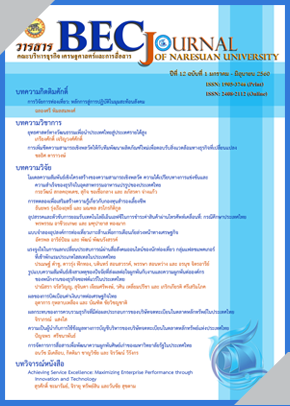ผลของการบิดเบือนค่าเงินบาทต่อเศรษฐกิจไทย
Main Article Content
บทคัดย่อ
การวิจัยนี้มีวัตถุประสงค์เพื่อวัดขนาดของการบิดเบือนของอัตราแลกเปลี่ยน และวัดผลกระทบจากการบิดเบือนของอัตราแลกเปลี่ยนต่อเศรษฐกิจของไทย จากข้อมูลทุติยภูมิของตัวแปรรายไตรมาส ตั้งแต่ปี พ.ศ. 2541 - 2557 ภายใต้ระบบอัตราแลกเปลี่ยนลอยตัวแบบจัดการ โดยการบิดเบือนของอัตราแลกเปลี่ยนของไทยและสหรัฐอเมริกา ใช้แบบจำลองการกำหนดอัตราแลกเปลี่ยนดุลยภาพ และหาความสัมพันธ์ในระยะยาวด้วยวิธี Cointegration ด้วยแบบจำลอง Johansen Test (Johansen and Juselius, 1990, pp. 169-210) ซึ่งจะนำผลการบิดเบือนจากดุลยภาพของอัตราแลกเปลี่ยนมาวัดผลกระทบที่เกิดขึ้นต่อภาคเศรษฐกิจไทยด้วยแบบจำลอง VAR และวิเคราะห์ Impulse Response Function
ผลการวิจัยพบว่าอัตราส่วนของราคาสินค้า nontraded ต่อราคาสินค้า traded อัตราสินทรัพย์ต่างประเทศต่อ GDP และอัตราการค้า มีความสัมพันธ์กับอัตราแลกเปลี่ยนดุลยภาพ และผลกระทบจากการบิดเบือนของอัตราแลกเปลี่ยนส่งผลต่อดัชนีหลักทรัพย์เท่านั้น ทั้งนี้อันเนื่องมาจาก ระบบอัตราแลกเปลี่ยนลอยตัวแบบจัดการ และการแทรกแซงด้วยนโยบายรัฐบาลค่อนข้างมีประสิทธิภาพในการรักษาเสถียรภาพของค่าเงินบาท อย่างไรก็ตามการดำเนินนโยบายโดยใช้อัตราแลกเปลี่ยนเป็นปัจจัยหลักเพื่อกระตุ้นภาวะเศรษฐกิจจะส่งผลกระทบเพียงในระยะสั้น ซึ่งรัฐบาลควรมีมาตรการอื่นๆ กระตุ้นเศรษฐกิจโดยเน้นที่การพัฒนาโครงสร้างพื้นฐาน การพัฒนาประสิทธิภาพการผลิตและทุนมนุษย์
Impacts of Misalignment in Thai Baht on Thai Economy
The objectives of this research are: to measure the size of exchange rate misalignment and to identify the effect of misalignment on Thai economy. The data consist of time-series quarterly data during 1998 – 2014 using the Johansen Cointegration test to identify the misalignment of exchange rate between Thai baht and U.S.dollars. The long-term equilibrium exchange rate was calculated to identify the misalignment scale. Next, VAR model and Impulse Response Function were set up to measure the effect of misalignment on the economy of Thailand.
The results indicated that the long-term equilibrium exchange rate depend on the ratio of the prices of nontraded and traded goods, foreign assets to GDP and the terms of trade. The results of the analysis, by using Impulse Response Function, found that the shock of misalignment only affect the stock index. It could be summarized that managed exchange rates system and government intervention were effective enough to stabilize the Thai baht. It was, however, difficult to use exchange rate as a key factor to stimulate the Thai economy such as the devaluation of Thai baht. That would impact the Thai baht in the short term. It would be reasonable to suggest that the government should have other ways to stimulate the Thai economy. For example, developing infrastructure, productivity and human capital.
Article Details
เอกสารอ้างอิง
ดาการ กุหลาบเหลือง และ บัณฑิต ชัยวิชญชาติ. (2560). ผลของการบิดเบือนค่าเงินบาทต่อเศรษฐกิจไทย. วารสารบริหารธุรกิจ เศรษฐศาสตร์และการสื่อสาร, 12(1), 124-136.


